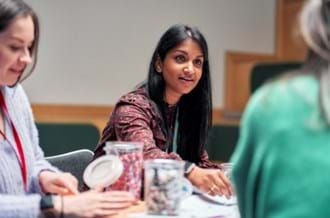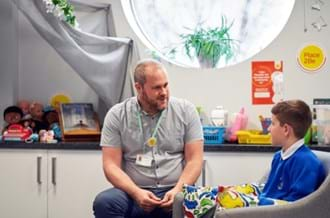Our therapeutic approach to children's and young people's mental health
Our therapeutic approach to children's and young people's mental health
We use a practice-led therapeutic approach to children's and young people's mental health. Our therapeutic approach is backed by research and informed by over 30 years' experience providing mental health services in schools.
Integrative support for children and child development
Attachment theory, which suggests our early relationships affect our development, informs all our support.
Our mental health professionals use an integrative approach. This integrative support for children and young people brings together different strands of therapeutic thinking to support the development of each pupil. Our integrative support is:
- person-centred – helps pupils and family members make the best decisions for themselves
- psychoanalytic – explores how buried thoughts, feelings and experiences shape current relationships
- systemic – works with pupils and family members in the context of their relationships and environment.
Our mental health professionals may also apply aspects of the following therapy techniques:
- cognitive behavioural – helps pupils and family members manage problems by changing how they think and behave
- solution-focused – helps pupils and family members work towards solutions.
Our mental health professionals may have additional expertise, enabling us to support children and young people in a way that suits them.
Relationships, self-awareness and play
Three core principles guide our work:
- building relationships – in the Place2Be room (a therapeutic relationship based on trust) and outside (positive relationships with others)
- developing self-awareness – for our mental health professionals (so they can provide effective support) and clients (to help them manage their emotions)
- encouraging play – as a 'language' for children, young people and adults that allows them to explore feelings and learn new things.
Our evidence base
We monitor the effectiveness of our therapeutic approach by collecting data about our work and using it to measure our impact. External clinical research backs our distinctive therapeutic approach.
Read about our statistics and evidence
Safety and ethics
Safe and ethical practice is a priority for Place2Be.
We train all our mental health professionals in safeguarding processes and procedures.
We are an organisational member of the British Association of Counselling and Psychotherapy (BACP) and abide by their Ethical Framework for Counselling Professions.
News & blogs

Uniting health and schools to improve mental health
Read Place2Be Chief Executive, Catherine Roche's, thoughts on uniting health and schools to improve mental health.
Read more
Hayley and Jaynie's experiences on Place2Be’s Level 5 Certificate course
Read Hayley and Jaynie's experiences on our Level 5 course and their engagement with our unique therapeutic approach.
Read more
Russell's experience on Place2Be's Level 4 Diploma
Read Russell's experience on our Level 4 Diploma and his desire to encourage more men to consider counselling as a career.
Read more



